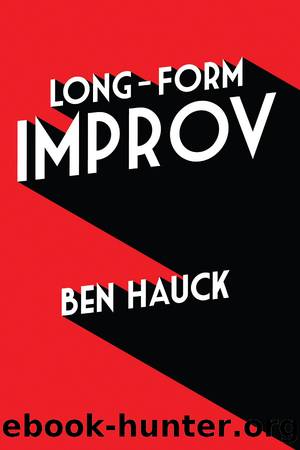Long-Form Improv by Ben Hauck

Author:Ben Hauck
Language: eng
Format: epub
Publisher: Skyhorse Publishing
20
Managing Your Attitude
While a player who is out for herself may succeed as
a stand-up comic, she wonât make it as part of a good
improv ensemble.
âPatricia Ryan Madson, Improv Wisdom: Donât Prepare, Just Show Up
The word âattitudeâ refers to thinking. Specifically, it refers to the direction of your thinking. For example, if I said to you that you had âa great attitude,â your thinking would be directed toward things I probably thought were great. If I said you had âa bad attitude,â presumably your thinking would be directed toward things I thought were bad.
Contrary to what you may believe, your attitude is not fixed; it is manageable. If your attitude is the direction of your thinking, then you can change the direction of your thinking. You can align your thinking with something great rather than align it with something not so great. Just as well, you can align your thinking with something greater than great.
A number of issues that emerge in improvised scenes are the result of problematic attitudes. Some actors experience troubles in their improvised scenes because they are stubbornly oriented in one direction in their improvised scenes and donât change that direction. Many times, they simply need a reorientation and redirection in how they think in their improvised scenes. Set on the new course, their stubborn issues can immediately, âmiraculously,â disappear.
But many people think they have no control over their thinking, and as a result they believe their attitudes are âstuck.â I disbelieve that, and I often show evidence to the contrary in the long-form improv classes I teach. Actors can think differently about their improvised scenes and quickly get past struggles they may repeatedly have. As a result of a subtle shift in attitudeâa subtle shift in thinkingâactors can awaken incredible new directions to their improvised scenework.
Many actors first trying long-form improv find that a lot of their improvised scenes get stuck in deadlocks. Iâve found that you can play with a pleasing amount of deadlock in your improvised scenes in an entertaining way as long as you maintain a cooperative attitude. A cooperative attitude is a mindset in which you are ultimately and steadfastly focused on reaching bilateral agreement and getting a win-win outcome.
The opposite of a cooperative attitude is a noncooperative attitude. There are three basic kinds of noncooperative attitudes, all of which I simply call âcompetitive attitudes.â A competitive attitude is a mindset focused on anything but a win-win outcome; that is, itâs a mindset thatâs focused on win-lose, lose-win, or lose-lose outcomes. Anyone holding a competitive attitude is interested in an outcome that ultimately creates a loserâan outcome in which at least one character canât get what he wants.
You might play the most violent, abusive, argumentative character and still have a cooperative attitude. To do so, you need to have a cooperative attitude in your player-game. When you do, despite the noncooperative appearance of your character-game, you are still directed toward bilateral agreement between the characters.
Similarly, you might play the friendliest neighbor, the nicest grandmother, or the cutest child and still have a competitive attitude.
Download
This site does not store any files on its server. We only index and link to content provided by other sites. Please contact the content providers to delete copyright contents if any and email us, we'll remove relevant links or contents immediately.
| Acting & Auditioning | Broadway & Musicals |
| Circus | Direction & Production |
| History & Criticism | Miming |
| Playwriting | Puppets & Puppetry |
| Stage Lighting | Stagecraft |
Call Me by Your Name by André Aciman(20515)
Ready Player One by Cline Ernest(14675)
How to Be a Bawse: A Guide to Conquering Life by Lilly Singh(7486)
Wiseguy by Nicholas Pileggi(5782)
The Kite Runner by Khaled Hosseini(5178)
On Writing A Memoir of the Craft by Stephen King(4942)
Audition by Ryu Murakami(4930)
The Crown by Robert Lacey(4814)
Call me by your name by Andre Aciman(4682)
Gerald's Game by Stephen King(4653)
Harry Potter and the Cursed Child: The Journey by Harry Potter Theatrical Productions(4506)
Dialogue by Robert McKee(4400)
The Perils of Being Moderately Famous by Soha Ali Khan(4219)
Dynamic Alignment Through Imagery by Eric Franklin(4215)
Apollo 8 by Jeffrey Kluger(3707)
The Inner Game of Tennis by W. Timothy Gallwey(3687)
Seriously... I'm Kidding by Ellen DeGeneres(3633)
How to be Champion: My Autobiography by Sarah Millican(3593)
Darker by E L James(3516)
